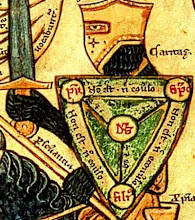Same word.
Different dictionary.
We already saw that
they declare that they believe that God is Almighty but denies that He is
omnipotent. But it is clear, in the dictionary and in the Bible, that
“Almighty” actually means “Omnipotent.” (Read “Almighty But Not Omnipotent Part 1”)
We
see this “same-word-different-dictionary” dilemma in their statement of faith
regarding what the ADD believes about God and about our Lord Jesus Christ: “We believe in the Almighty God, the Father, the Creator of the universe, in Christ
Jesus, the Father’s begotten son, a
true and Mighty God, the only savior
of mankind and the only way to the Kingdom of God in heaven” (Members Church
of God International, Beliefs.
Emphasis added). They appear to teach
that “Almighty God” is different from “Mighty God.”
In
doing so, the ADD has fallen into the same error like that of the Jehovah’s
Witnesses: “Jesus is spoken of in the
Scriptures as ‘a god,’ even as ‘Mighty
God.’ (John 1:1; Isa. 9:6) But
nowhere is he spoken of as being Almighty, as Jehovah is.” (Reasoning
from the Scriptures, 150. Emphasis added.)
But, the Bible does
not really make a distinction between “Almighty God” and “Mighty God.” It is
because “Almighty” and “Mighty” mean one and the same: “The name Almighty means ‘the mighty one’
and is probably derived from the verb meaning ‘to be strong’”.
(Paul P. Enns, The Moody Handbook of
Theology, 195. Emphasis added)
In
the Greek New Testament, “Mighty One” is ὁ δυνατός,
which is “a title for God, literally ‘the
one who is able’) one who is capable of doing anything—‘the Mighty One, Mighty God, the Almighty’” (Louw and Nida, 675.
Emphasis added.) So, in its original
language, “Mighty God” means “Almighty.”
Yes, Isaiah 9:6 called Jesus “Mighty God”
: “For to us a child is born, to us a son
is given; and the government shall be upon his shoulder, and his name shall be
called Wonderful Counselor, Mighty God,
Everlasting Father, Prince of Peace.” (English Standard Version. All Bible
verses are the ESV, unless otherwise noted.)
But
Isaiah called the Almighty God as the “Mighty God” also: “A remnant will return, the remnant of Jacob, to the mighty God. … For the
Lord GOD of hosts will make a full end, as decreed, in the midst of all the
earth.” (10:21, 23)
Note
that “the Lord GOD of hosts” in verse 23 is translated as “LORD Almighty”
in the New International Version. “The
Lord, the LORD Almighty, will carry
out the destruction decreed upon the whole land.” (Emphasis added) So, as far as Isaiah is concerned,
“the LORD Almighty” is the same as “the Mighty God.”
(Knowing
the ADD, they could reason out that verse 21 says “Mighty God” while verse 23
says “LORD Almighty.” So, they might try to explain that “God” is different
from “LORD.” But, note that, “LORD” in the NIV is in all capital letters. That
indicates that, in Hebrew, it is the divine name YHWH. It can also be
translated as “GOD,” which is the way the ESV goes. So, there’s no actual difference
at all between “Mighty God” and “LORD Almighty.”)
Thus, any attempt
to differentiate between “Almighty God” and “Mighty God” is merely playing with
words. But we are not supposed to toy with God. We are to trust Him for Who He
really is.
© 2012 Bible Exposé Apologetics Ministry. To know more about us, click here.
________________________________
REFERENCES
“Beliefs.” Members of the Church of God, International. http://mcgi.org/en/teachings_and_works/beliefs/. Accessed September 23, 2012.
Enns, Paul P. The Moody Handbook of Theology. Chicago, IL: Moody Press, 1989.
Louw, Johannes P. and Eugene Albert Nida. Greek-English Lexicon of the New Testament: Based on Semantic Domains, vol. 1. Electronic ed. of the 2nd edition. NY: United Bible Societies, 1996.
Reasoning from Scriptures. Brooklyn, NY: Watchtower Bible and Tract Society of New York, 1985, 1989.


<< Home